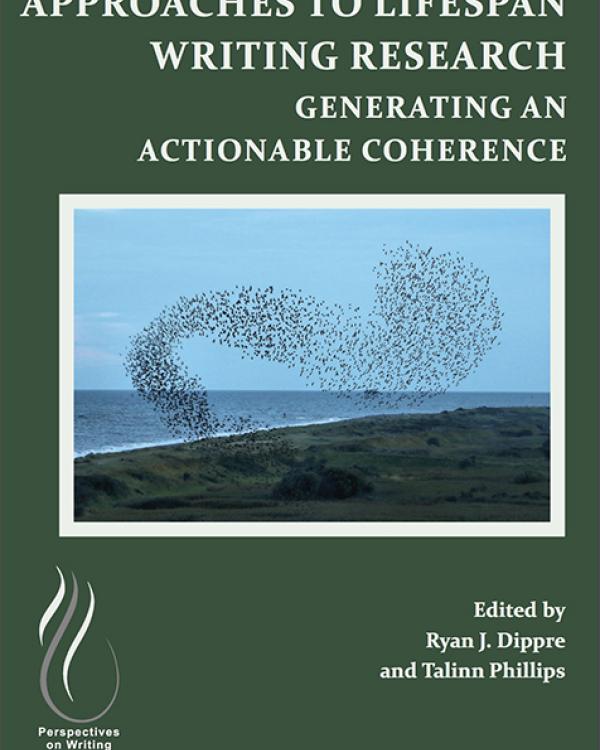
The recently published Approaches to Lifespan Writing Research: Generating an Actionable Coherence (WAC Clearinghouse / University Press of Colorado, 2020), is co-edited by UC Santa Barbara’s Gevirtz School alumnus Dr. Ryan Dippre—with Dr. Talinn Phillips—and features a preface written by Dr. Charles Bazerman of the Department of Education. The book also features a chapter written by Department of Education Associate Professor Diana Arya and students Anthony Clairmont and Sarah Hirsch.
This edited collection builds on the three themes that emerged from the 2018 inaugural lifespan writing conference—identity, society, and theory—to further the study of writing through the lifespan. The contributors to this collection provide a framework within which the reader can develop a dynamic, interdisciplinary, multifaceted understanding of the limits and possibilities of studying lifespan writing. Recognizing that such research requires methodological rigor and flexibility as well as theoretical precision and adaptability, Approaches to Lifespan Writing Research draws on a range of methodological and theoretical approaches, from autoethnography to longitudinal structural equation modeling. This methodological and theoretical flexibility reflects the challenges inherent in studying lifespan writing—in particular, the need to develop an integrated framework that enables the “translation” of research findings for use by other lifespan writing researchers. Approaches to Lifespan Writing Research begins that process.
“It’s probably fair to say that this collection wouldn’t exist without Chuck [Bazerman],” Dippre says. “In fact, the entire lifespan writing focus in our field would have little traction if it wasn’t for the work he’s been doing. Chuck has been a central figure for lifespan writing research, and I think the work of the collection, and of the Writing through the Lifespan Collaboration more generally, has really been influenced by his passion for collaboration (particularly multi-disciplinary collaboration) and his eagerness to take on challenging research projects. His work has always read (to me, at least) as a careful mix of discipline and daring, and I think that spirit has really carried through in the chapters of this collection.”
Ryan J. Dippre is Assistant Professor of English and the Director of College Composition at the University of Maine. He earned his Ph.D. from UCSB’s Department of Education in 2015. He has published in Literacy in Composition Studies and English Journal, among other places. His book, Talk, Tools, and Texts: A Logic-in-Use for Studying Lifespan Literate Action Development, is available at the WAC Clearinghouse / University Press of Colorado. He serves as the co-chair of the Writing through the Lifespan Collaboration, a group of international scholars interested in developing a multi-site, multi-method, multi-generational study of writing through the lifespan. His research interests include lifespan writing research and writing program administration.
Charles Bazerman is a Distinguished Professor in the Department of Education at UCSB. He has been lauded with the NCTE’s 2018 James R. Squire Award and its 2020 CCCC Exemplar Award. His commitment to literacy and the teaching of writing started almost fifty years ago when he was teaching first and third grade in inner-city Brooklyn. Then he saw concretely how learning to read and write changed the dispositions and bearing of individual children, made possible a successful relationship to schooling, and improved life chances. A few years later, when he began teaching at City University of New York during the early years of open admissions, he found professional satisfaction in helping students enter into the literate discussion of the university. His research and pedagogic interests started from the teaching of writing to encompass the ways we make use of reading in our writing and then the ways in which academic writing is organized around the literatures of the several disciplines.
His book Shaping Written Knowledge: The Genre and Activity of the Experimental Article in Science examines the history and current forms of scientific research writing. In The Languages of Edison’s Light he examines how technical discourses and projects intersect with many other discourses of civic, economic, and cultural life. His recent volumes A Rhetoric of Literate Action and A Theory of Literate Action put together his understanding of writing developed over many years. Other books and articles consider aspects of academic and professional writing, writing across the curriculum, the role of writing in social organization, the lifespan development of writing skills, and the relation between writing and cognitive development.
He has also written many textbooks for teaching university reading and writing and the relation between them. He has edited the Handbook of Research on Writing and numerous other research collections and series. He has been Chair of the Conference on College Composition and Communication and is founder and chair of the International Society for the Advancement of Writing Research.
Talinn Phillips is Associate Professor of English at Ohio University where she also directs the Graduate Writing and Research Center. She is a co-founder of the Writing Through the Lifespan Collaboration.